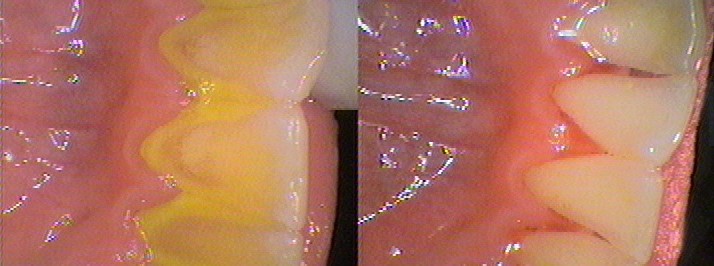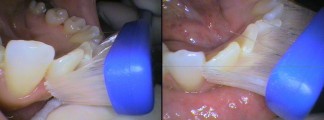Treatment of Enamel Defects (Hypoplasia and Hypo-calcification)
Part One: Prevention
These defects are life-long in the permanent adult teeth.
As these defects mean a weakening of the enamel constant monitoring is needed. The defective enamel is more porous and weaker in strength. Over time normal activity can wear this weaken tooth material. Regular monitoring is very important; therefore treatment involves the following:
- Prevention
- Early intervention
- Restoration – difficult to bond materials
- More extensive treatment – crowns
- Other options – more severe cases

Hypocalcification of all first molars
This week: Prevention
- Regular check-ups at least 6 monthly to assess the surface of the tooth. The diet is very important. Care with sticky sweet foods is essential as these teeth will decay extremely quickly, often severely compromising the tooth for life!
- Regular x-rays to check for decay between the teeth and within the tooth itself. Often decay within the tooth is difficult to assess visually with these teeth as the colour of the tooth can stain to look like decay. This is especially so in cases where most of the tooth is affected in this way.

Sue is happy that your gums are happy
- Scale and clean – important to keep the bacteria off these teeth as much as possible with regular professional cleaning every 6 months.

Left: Plaque and calculus build up; Right: After scale and clean, much better.
- Fluoride treatment is applied to the surface of the tooth at each check-up. As the tooth surface is porous then the fluoride will be absorbed into the tooth more. This will help change the chemical structure of the enamel to be more resistant to decay. However the poor structure of the enamel, or even lack of it, is not helped by the fluoride. High concentrated fluoride toothpaste such as NeutroFluro toothpaste can helpful as well. The dentist will be able to assess the need for this.
- Tooth cleaning technique – incorrect cleaning and over brushing will damage the weaken enamel very quickly. Yes the toothbrush in the incorrect hands can cause lifelong grief to these teeth, by even creating “holes” that allow bacteria to invade the tooth, making an even bigger mess.

Toothbrush - angled into gums, then wipe up the tooth
Need an Appointment?
If you’d like to book an appointment with the dentist at Seymour Dental then call us in Dulwich Hill, Sydney on (02) 9564 2397 or
contact us
Next week
Treatment of Enamel Defects (Hypoplasia and Hypo-calcification) - Part Two: Early Intervention